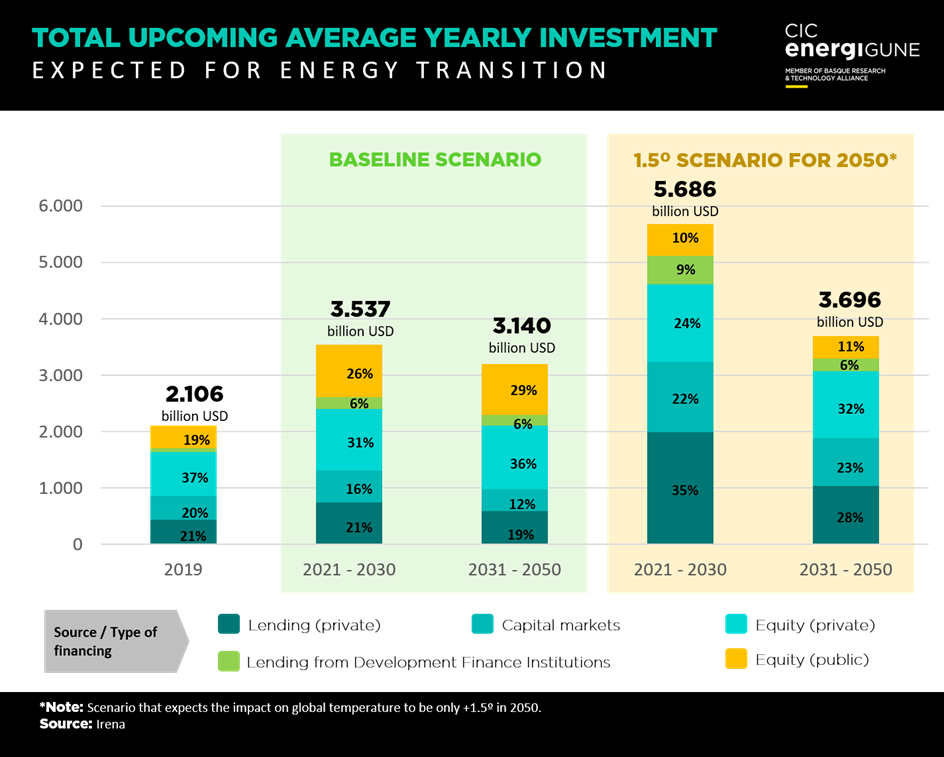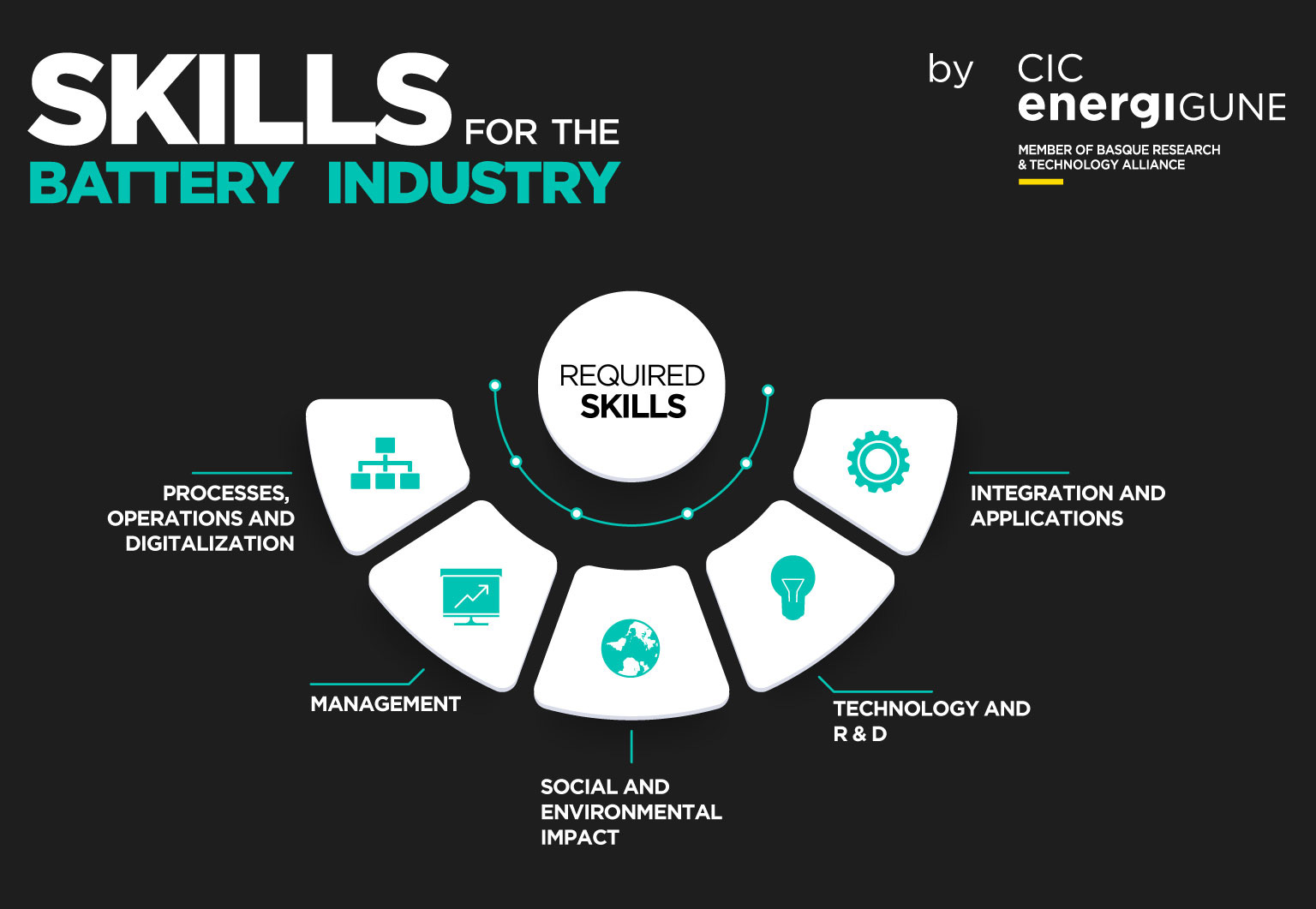The first of these is obviously the economic impact. After all, the industries and activities associated with the energy transition are expected to gain prominence in the coming years, which will mean that they will account for an increasing share of the GDP of those countries and regions that are committed to them.
Above all, in the short and medium term, this impact on GDP will be based on the heavy investments that are expected to be made in order to accelerate the deployment of key activities and technologies for the energy transition. According to the International Renewable Energy Agency (IRENA), an investment of almost 130 trillion euros will be required worldwide by 2050 to achieve the environmental targets set. At the national level, the volume of investment to meet the objectives of the National Integrated Energy and Climate Plan (PNIEC) will reach 241,412 million euros by 2030.
In this sense, the Basque Country is also betting heavily on the development of these investments within its roadmap towards sustainability (known as the "Basque Green Deal"). For example, the Energy Transition and Climate Change Plan 2021 - 2024 approved by the Basque Government last October plans to allocate more than 300 million euros in the coming months to promote different actions. This amount is only part of the 1,300 million euros of investment that Basque public institutions have activated in recent months through public-private collaboration models with large companies in the territory to accelerate the decarbonization of the Basque Country.

Thanks to these investment volumes, it is expected that additional demand and production will be generated in other economic sectors (such as construction or manufacturing industries), which will not only make it possible to recover the money spent, but also to increase in the long term the return obtained for each euro invested. This is attested to by studies that have tried to estimate this potential impact and return, such as the "Adapt Now" report published in 2020, which set a return of up to 10 euros for each euro invested in measures for energy transition and against climate change.
Beyond the economic impact by itself, this commitment to new models is also expected to generate an incentive effect in terms of the evolution of the industry closest to where it is being developed. Not only because of the energy transition that the industry and its agents will undergo, but also due to the impulse that it is expected to generate in key elements such as the qualification of the workforce or the production processes themselves.
Starting with the impact in terms of employment, according to the latest detailed report in this regard by the International Labor Organization (published in 2018); the energy transition could generate more than 24 million jobs worldwide by 2030. In similar figures moves, again, IRENA in its latest estimate made in 2021, placing this figure at around 25 million.
But beyond these volumes, the technical nature of the activities associated with the energy transition will require a highly qualified workforce, which will have an impact on the training of the professionals involved, as well as on the attraction and transformation of talent in local and regional industry.
As we detailed more specifically in our analysis of jobs in the battery sector, all industries linked to the energy transition are expected to require a high degree of specialization in knowledge and skills related to technology, processes, operations, digitalization, R&D, environmental impact...

In short, a mix of knowledge that will turn these profiles into more dynamic and versatile professionals, which will benefit not only the industry directly associated with the energy transition and its development, but also the local and regional networks, which will see a higher qualification of the available job offer.
Among other things, this higher qualification will be due to another of the major impacts that the energy transition is expected to have on its environment. Specifically, we are talking about the digitalization and technological evolution that is expected to accelerate the development of those sectors linked to the energy transition, which are expected to be one of the cornerstones in the implementation of new models based on the so-called "Industry 4.0".
Indeed, the development of new technologies and energy vectors such as the already mentioned batteries, hydrogen, thermal solutions... are from their first steps benefiting from the use of analytical solutions, robotics, artificial intelligence or the Internet of Things. All of them, platforms and tools that represent a "qualitative leap" compared to the way of doing things until now. Hence, the deployment of sectors linked to the energy transition means, in itself, contributing to the push and expansion of these new approaches to the industrial fabric where they are developed.
So far, we have listed the economic and industrial impacts expected from the energy transition. However, the strategic value of this commitment goes beyond these benefits, which reinforces its positioning within the roadmaps of different countries and regions.
One of its clearest impacts is on the health of humanity itself. According to the World Health Organization, global warming will cause more than 250,000 deaths per year between 2030 and 2050, due to effects such as rising temperatures, extreme weather or the existence of pollutants in the atmosphere and infectious vectors (such as food or water). Hence the critical importance of slowing down this warming through approaches such as the energy transition, which seeks to reduce this warming and its possible effects as much as possible, if not to avoid it.
Other expected benefits are also associated with social and demographic variables. For example, the promotion of energy efficiency in homes is expected to help especially those with lower incomes, thanks to the savings that can be made in proportional terms in electricity and heating. In this sense, studies such as the one included in the aforementioned PNIEC (based on data from the Basque Centre for Climate Change) confirm this potential benefit.
In addition, it must be taken into account that the energy matrix foreseen with this transition model will require the development of infrastructures and projects in different locations, which in many cases are far from large urban centers. This situation represents an opportunity to respond to the demographic challenge faced by many States and regions, by developing new sources of activity and income in areas with a higher rate of depopulation.
These are just some of the major benefits that the energy transition is expected to bring in the future. Hence, its role goes beyond the much-desired sustainability and reduction of the environmental footprint, becoming an indispensable milestone to be reached by all governments and agents who want to continue leading the world of tomorrow. This is also the reason for the "competition" that in many cases is beginning to take place between countries or companies in this race through major announcements and investment plans.
If you want to know more about how CIC energiGUNE seeks to contribute to this transition, we invite you to dive into our website, where you can find details of our activity, as well as ways to collaborate with us in achieving our goal: to make sustainability a reality. By doing so, we will also contribute to the other expected benefits for a better future.

Author: Iñigo Careaga Aja, Business Analyst at CIC energiGUNE.

If you want to know the latest trends in energy storage and new developments in research, subscribe.

If you want to join a top-level team, collaborate with specialists in multiple disciplines or tell us about your concerns, don't think twice...